
About this time 20 years ago, the San Francisco 49ers were celebrating victory over San Diego in Super Bowl XXIX. That same year, Mark Davis won the 1995 Bassmaster Classic.
Today, as the New England Patriots revel in their fourth Super Bowl win, Davis is preparing for the 2015 GEICO Bassmaster Classic that marks the 20th anniversary of his crown.
Football is played much in the same way as it was in 1995. Players block, tackle, throw and catch mostly inflated balls, and winning still requires running it in from the 1. The Classic is also quite similar in that anglers still cast, catch and cull for the heaviest weight over three days. Yet there are marked differences from 20 years ago, most good, Davis said.
Among the biggest differences is how bass fishing fans are now treated to cast-by-cast coverage. Last year, it was well-documented how Randy Howell plied a bridge to win the title on Guntersville. As a matter of fact, fans could read and in some cases see every catch on Bassmaster.com.
For Davis, though, much of his 1995 Classic fishing wasn’t covered at all. Everything centered on the weigh-in. And a winner, caught up in the excitement and hoopla, might forget to mention key parts of his day. In Davis’ case, it was a catch that was the difference between winning and second place.
Most fans don’t know about it, even today. A story on his rare “double” catch didn’t come out for weeks, and then it was only for a select audience.
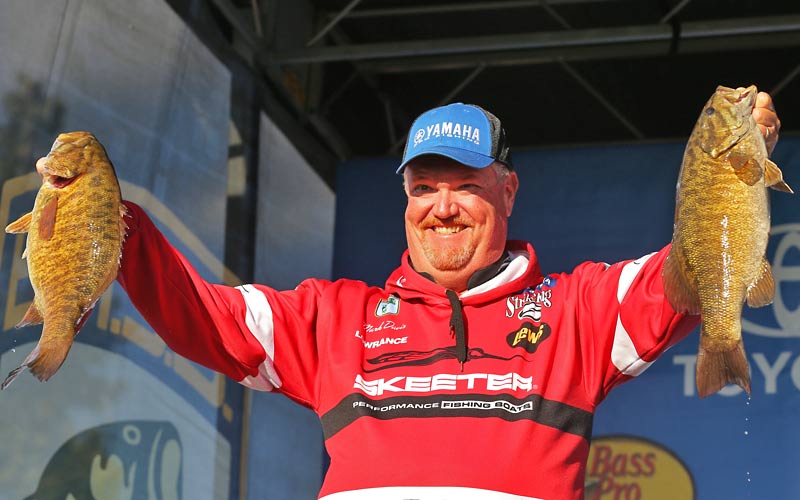
“A lot of those stories, they kind of got lost,” said Davis, referring to a moment in the day when he caught two fish on the same cast. “But that was the deciding factor for me winning that event.”
It wasn’t until Davis came down off his Classic high that Bassmaster.com editor Steve Bowman, at the time outdoor editor at the Arkansas Democrat-Gazette, did a follow-up story detailing Davis’ winning moves.
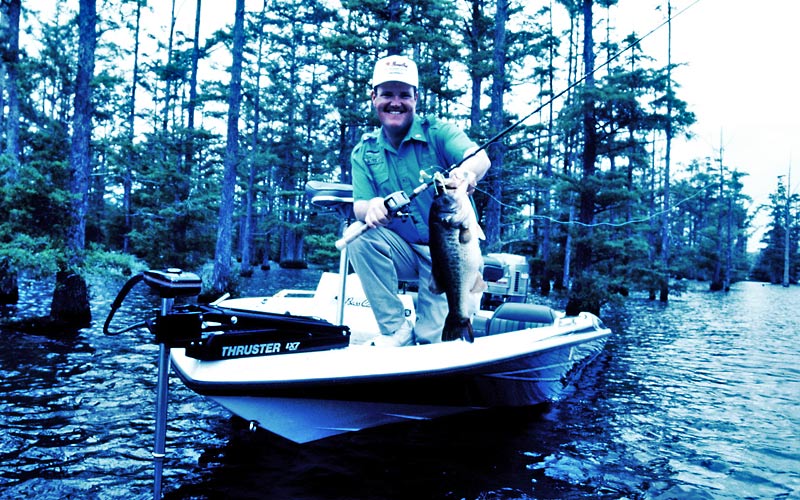 Davis was trailing Mark Hardin on High Rock Lake in Greensboro, N.C., when he hooked two fish on a crankbait. With no nets allowed, he tried to flip his double in the boat, but they came unbuttoned, the 2-pounder falling back into the lake and the 4-pounder fortuitously landing on his deck. That fish helped Davis total 47 pounds, 14 ounces to win by 1-14.
Davis was trailing Mark Hardin on High Rock Lake in Greensboro, N.C., when he hooked two fish on a crankbait. With no nets allowed, he tried to flip his double in the boat, but they came unbuttoned, the 2-pounder falling back into the lake and the 4-pounder fortuitously landing on his deck. That fish helped Davis total 47 pounds, 14 ounces to win by 1-14.
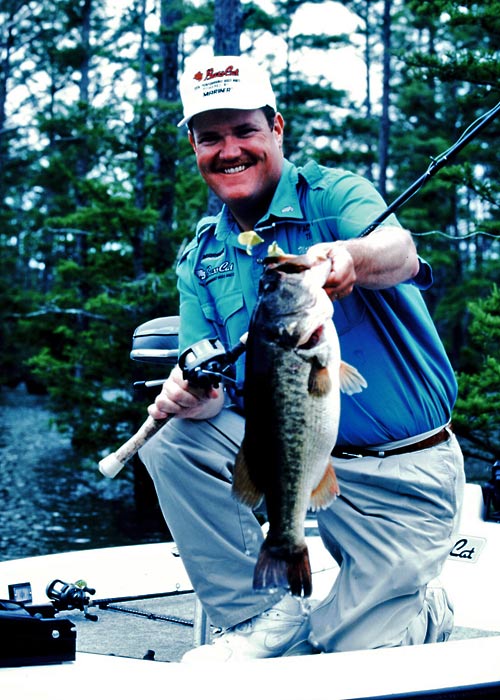 Bowman equated the miraculous occurrence to the NFL’s most famous play of all-time, Franco Harris’ Immaculate Reception.
Bowman equated the miraculous occurrence to the NFL’s most famous play of all-time, Franco Harris’ Immaculate Reception.
“It’s always bothered me that our sport didn’t get to see its Immaculate Reception,” Bowman said. “How big was that catch for the NFL? For bass, we had an Immaculate Reception and it just went into the livewell.”
In that era, writers rode along with competitors and also fished, hoping for a whopper to win some cash. But the main thrust of those ridealongs was aiding their storytelling. That didn’t always work, as evidenced in Davis’ case.
“The media guy may be a writer from little newspaper, and he may not have even realized the impact of it at the time,” Davis said. “Now, those stories come to the forefront because of the way the media is.”
Immediacy in reporting is among the biggest changes Bowman has seen, and he’s responsible for much of it. In years past, information was slow to travel, and it might be months before even an interested B.A.S.S. member found out details of who won.
“The TV show of Mark Davis winning the Classic didn’t air for 6 months or later,” he said. “Bassmaster Magazine didn’t show up for possibly a month. You were lucky if your newspaper printed the results. You didn’t have all this immediate information.”
Bowman directs teams of reporters on the water providing the latest news and photos. Smartphone technology allows video to be uploaded to Bassmaster.com’s website instantaneously, and the TV cameras are rolling in the top anglers’ boats.
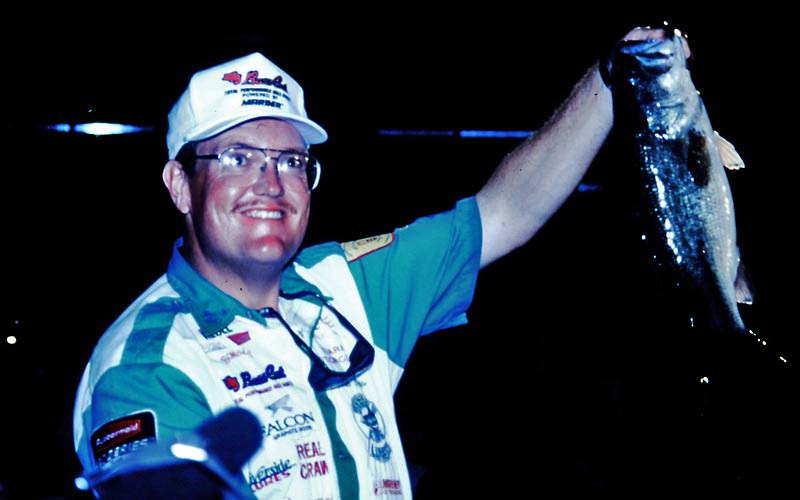
“No doubt, it helps the entire industry,” Davis said. “It keeps people glued to the media, trying to follow it that way. That sort of information is available now, where it wasn’t back in those days.”
This year, Bassmaster.com is upgrading to live webcasts. Five streaming cameras will provide on the water action of the top competitors. The story of the winning fish could be shown live on the Internet before anybody knows it’s the winning fish.
“Back then, nobody got to see Davis’ catch because there was only one cameraman on the water,” Bowman said. “And that was the difference in the game. Now, we get to see the difference in the game.
“Now, it’s on your phone, it’s on your computer. Even the TV product is just a few days after, and we’ve gone to the point of live TV, now we have live Internet.”
Davis ranks 10th all-time in Classic appearances with 18, which is tops among the field of 56 this year. While fishing is relatively the same, another major difference from 1995 is anglers now fish out of their own boats.
“The tournament itself, it’s different in that we’re fishing out of our own boat, but not a lot of different,” he said. “It’s still a pressure cooker type of event. As far as the tournament, it’s still the Classic.”
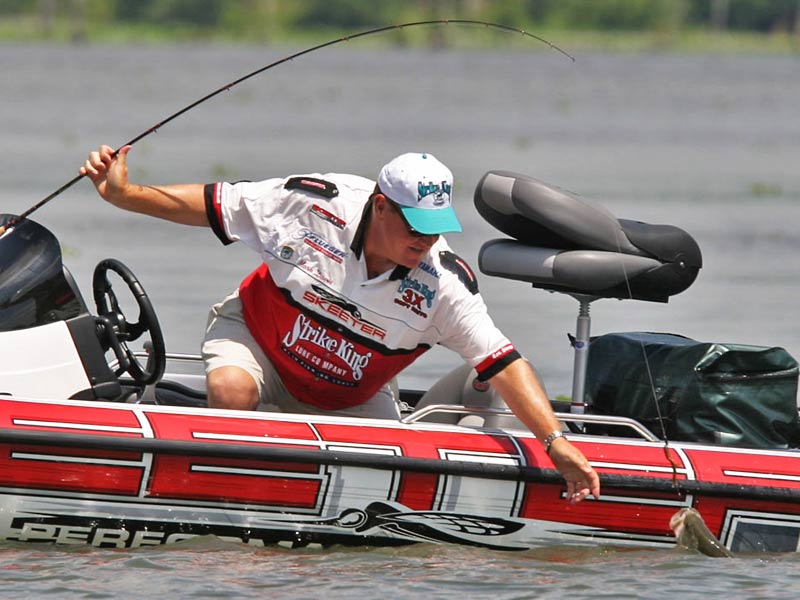 Winning the Classic has always been bass fishing’s greatest achievement. And yes, the early tournaments required anglers to fish from identical boats, starting from the first in 1971 when 25 anglers were provided Rebel Fastbacks. Ranger took over and as participant numbers climbed in the event, from 25, to 30, 40 (when Davis won), that practice gave way.
Winning the Classic has always been bass fishing’s greatest achievement. And yes, the early tournaments required anglers to fish from identical boats, starting from the first in 1971 when 25 anglers were provided Rebel Fastbacks. Ranger took over and as participant numbers climbed in the event, from 25, to 30, 40 (when Davis won), that practice gave way.
Being able to fish out of his own boat comforts Davis, yet he said probably the most significant changes that affects his fishing have been in equipment he brings in his boat.
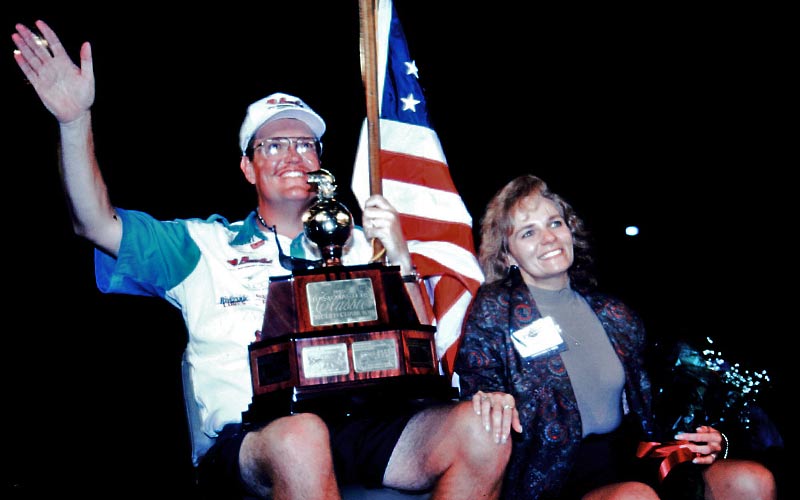 “Fishing in general, the biggest difference is the electronics we have nowadays,” he said. “The technology is so advanced from what it was 20 years ago.”
“Fishing in general, the biggest difference is the electronics we have nowadays,” he said. “The technology is so advanced from what it was 20 years ago.”
Davis said he’s amazed at the high-tech materials and features in today’s rods, reels, line and even some lures. He mentioned the fish finder units of the day.
“We had these screen units, but they aren’t nearly advanced as what they are now, with structure scan and everything we’ve got,” he said. “The equipment and technology has changed so much.”
Davis won on High Rock in August, 10 years before the move from summer to winter Classics. The 2005 event in Pittsburgh was the last summer Classic, followed seven months later by the first winter Classic on Toho. While Davis said he understands the long lead-up to today’s Classics benefits the sport, he’d rather fish in more stable weather.
“You’re at the mercy of Mother Nature now,” he said. “Brutal cold fronts, cold water, cold weather. I’d rather fish them in the summer — more comfortable.
“That’s a big difference, the weather being a factor, especially at a lake like Hartwell. We can have fishing weather, but we could also have horrible weather, snow, sleet, rain, cold wind blowing. In the summer, you don’t have to worry about that … you might get hot.”
Bowman said the move to winter might not be popular with all the anglers, but it’s helped in the growth of B.A.S.S.
“We start the season off kind of like how NASCAR does with its biggest event, Daytona,” he said. “Years ago, a lot of our bass seasons would be over by May or June, and there wasn’t that much time before the Classic in late July or August, so there wasn’t this big ramp-up.”
Being the kickoff to the bass fishing season not only allows anglers a longer time to gear up for the event, but the industry and fans flock to weigh-ins and Classic Expo, finding them great cures for cabin fever.
Davis has worked those Expo aisles, but he’s definitely been out on the water competing more, and he’s seen the practice schedule change for the better.
“We had a practice cutoff that was six weeks before the tournament,” he said. “It was probably tougher then because it was long – the fish would change so much from June to August. The practice period now is much more forgiving.”
Anglers were prohibited from being on Lake Hartwell beginning Jan. 1, but they will have three full days starting Friday, Feb. 13, then a final day on Wednesday, Feb. 18 before the competition starts on Feb. 20.
“You have more time closer to the event to find your fish, figure the fish out,” he said. “That part of it is actually easier now.”
While competitors cope differently with the current array of scheduled activities, Davis said there were actually more in years past. There were even mandatory events in the evenings of competition days.
“There’s still a lot of hoopla, the media day and all that, but back then, every night B.A.S.S. had something for you to do. Governor’s mansion for dinner, maybe to a casino,” Davis said. “Every night, everything was structured. It was pretty much mandatory you had to attend all these functions.
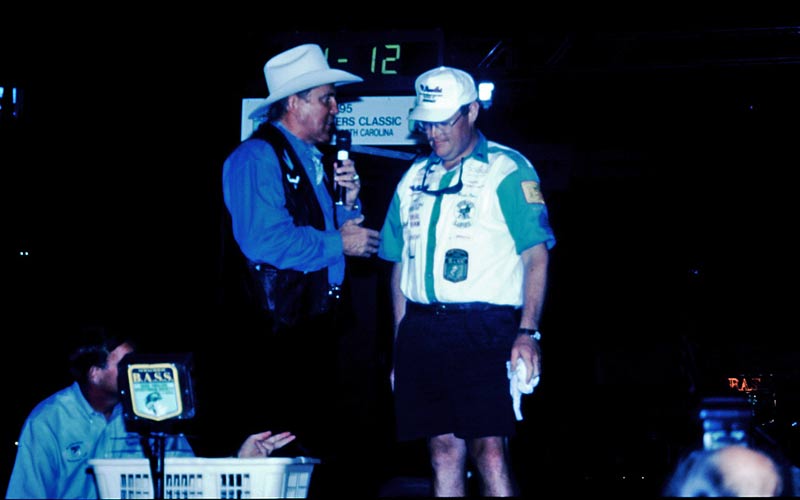 “Nowadays, you’re on your own most nights. You can actually get more rest. I like it a lot better, from that respect, because you can go at your own pace. You can take a nap.”
“Nowadays, you’re on your own most nights. You can actually get more rest. I like it a lot better, from that respect, because you can go at your own pace. You can take a nap.”
Bowman fondly recalls some of the more adventurous get-togethers, mentioning one Carnival night where game prizes were squirt guns and the affair broke into a huge water fight.
“It was pretty funny to see Ray Scott hiding behind a couch, popping up and squirting everybody,” he said. “It was like a revolving door, people trying to get into the bathroom to refill their guns.”
Davis said there were often themes and the anglers were even asked to dress in costume.
“I don’t remember dressing up like Elvis or anything, but a lot of guys did,” he said. “Ray was always right there with all this stuff.”
He said it’s fun to look back on it, but he and a number of other anglers couldn’t fully appreciate it at the time because they were more concerned about their fishing. Some would have liked free evenings to prep for the next morning.
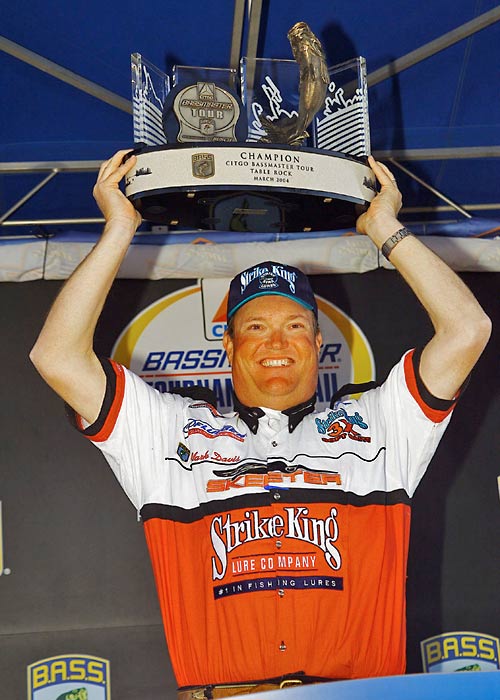
The Marshal program, where fans pay for the right to ride along with competitors, is relatively new. Bowman was among the media who actually fished in competitors’ boats for a cash prize. The media member with the biggest bass usually won $500, and Bowman said sometimes he had to win to pay his way home.
Speaking of winnings, Davis earned $50,000 in 1995. In the first Classic in 1971, Bobby Murray won $10,000. The first-place purse peaked at $500,000, and now stands at $300,000.
Bowman said winning the title is certainly worth much more. He wrote his first Classic story on George Cochran’s 1987 Classic victory, and said he later told him it was “worth a million dollars.”
“Today, people win a Classic and they say it’s worth as much as a million in endorsements,” Bowman said. “Heck, it was worth that in 1987. Some of them, it’s probably only worth a million dollars, but for those who are really savvy, it’s probably worth a lot more.
“Let me just say I don’t know any modern day Bassmaster Classic champions who are struggling.”

